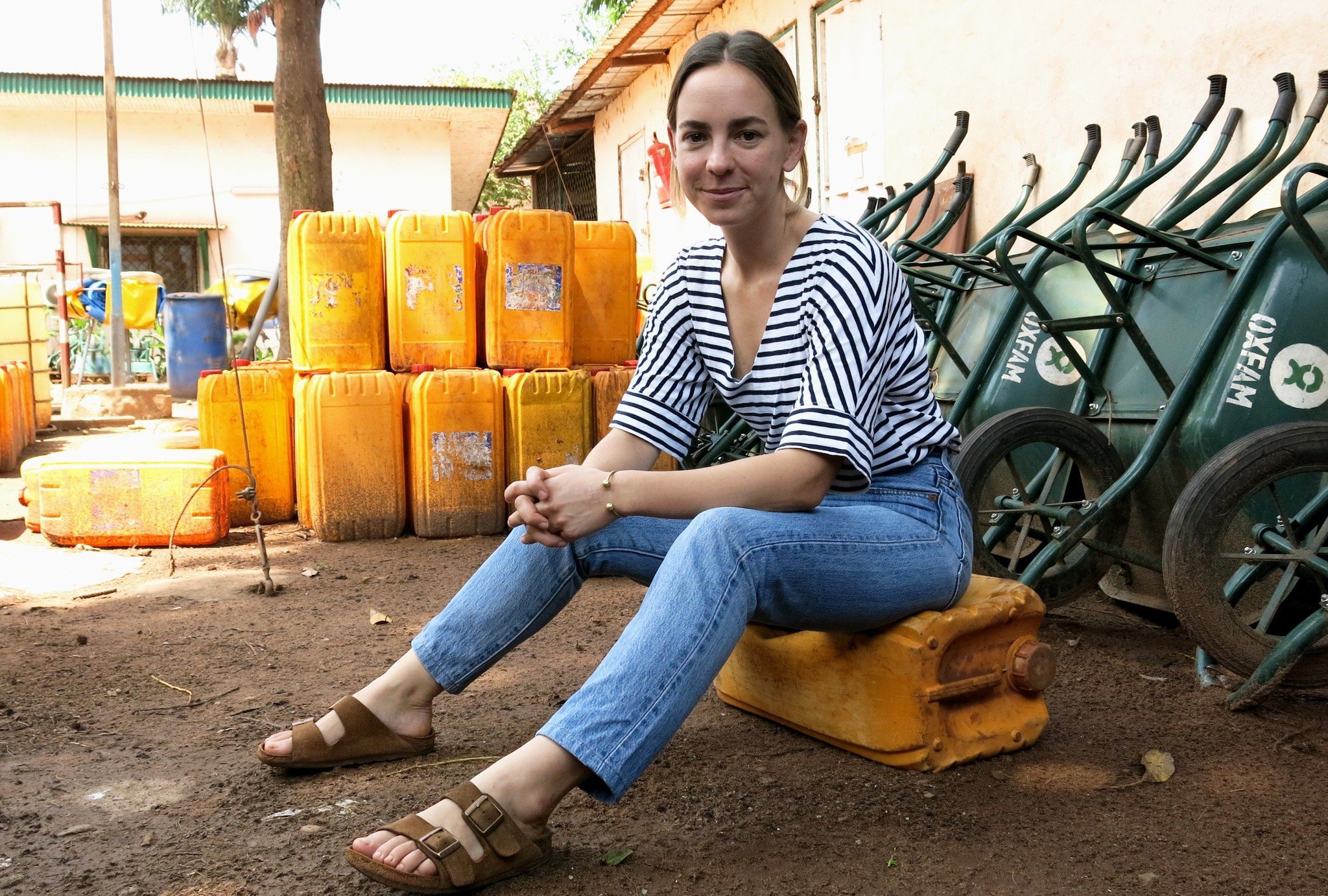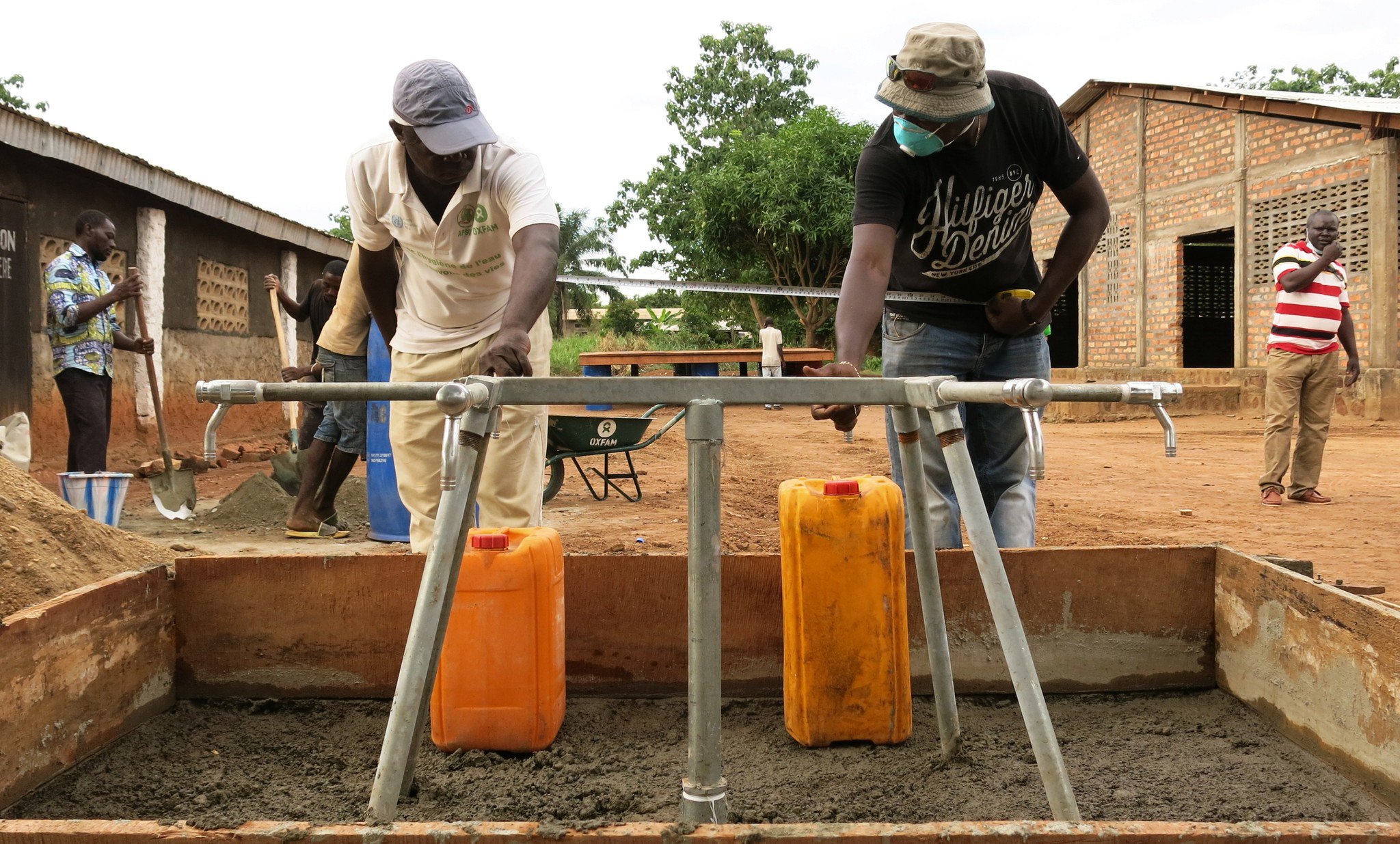Lily-Madeleine Séguin speaks about her work for Oxfam in the Central African Republic, on supporting public health in communities at risk for COVID-19.
The Central African Republic (CAR) has been affected by more than seven years of civil conflict, leaving it unprepared for the COVID-19 pandemic. Humanitarian groups estimate that 2.2 million people need humanitarian assistance, and 695,000 people have been displaced by conflict and are living in areas where it will be difficult to prevent the spread of the coronavirus. In this interview, Lily-Madeleine Seguin, who works in public health promotion for Oxfam’s Global Humanitarian Team tells us about Oxfam’s work with communities at risk of COVID-19.
Tell us about your day-to-day work:
I work with communities to reduce public health risks. To put it simply, I ask myself these questions: What do communities experience, what do they think, and how can we put them at the center of what we do? How can I help our teams to support and reinforce a community’s capacity to prevent and reduce public health risks-such as COVID-19?
I first came to help our sanitation management teams in Bria and Batangafo [two areas in the north of the country]. Then we were faced with something completely new. How can we continue to deliver our essential humanitarian activities despite the pandemic? How can we adapt our health promotion activities?
In Bria and Batangafo, Oxfam is managing a large water distribution system, and sanitation (waste management) for the both camps. All of Oxfam’s work focuses on how we work with communities – how do we have discussions and provide the necessary support and services that people need. All community meetings have been adapted -- we meet people in smaller groups to discuss community protection, health promotion, or managing water systems.
Our teams are also working on how to provide key information on diseases to communities. In certain areas, Oxfam has worked with local radio stations to develop spots on COVID-19. These spots help people have real time information about the disease and how to reduce the risk of transmission. We are talking about the importance of frequently washing our hands, which is hard when you don’t have easy access to water and soap. Oxfam has set up handwashing stations with soap or chlorinated water and holds trainings on proper hand washing techniques, and how to decrease the chances of transmission. A lot of our work consists of discussion and meetings with local community groups and leaders. Our teams are now working with these key people within the community to help map out those who would be most at risk should COVID-19 break out.
We are also making sure our meetings are in open and airy spaces where people can have the necessary physical distance between them, and ensuring all our meeting spaces have the necessary hand washing stations available.

In 2018 and 2019, you were in the Democratic Republic of Congo (DRC) for Oxfam’s response to Ebola. What lessons did you learn there?
We must involve communities right from the start. It helps to avoid misunderstanding, tensions between the response team and communities, violence, and can also help prevent a greater spread of the disease.
The communities’ response to Ebola was violent in the DRC. For example, the beds of those affected by Ebola were burned right in front of their houses. It’s very important that people don’t feel stigmatized. And it was commonly felt that because of the need for speed, there was no time for community engagement. It’s true that discussions take time. But we can't do it properly without involving people.
And how can we fight the rumors, myths, and misconceptions of illness and disease?
At Oxfam, we focus on activities which directly address community perceptions. Our teams go out and meet people. We take the time to listen and discuss what needs to be done. Our teams pay attention to people’s feelings, their way of perceiving the disease, their questions.
There are a lot of conspiracy theories. We are all slowly learning about this new disease and this means that we cannot necessarily provide answers to every question being asked. Sometimes people fill those gaps with our own ideas and theories. Some believe that black people are immune, others that [the virus] is a conspiracy from abroad to kill Africans. We must put an end to these kinds of ideas. This can only be done through trust, opening two-way communications, and listening to communities to understand their perceptions.

We are gathering information about people’s perceptions (questions, worries, rumors, misconceptions, myths) about COVID-19. Enabling our teams to have real time access to this type of information is the first in many steps to work on adapting the discussion and our actions to respond to people’s needs and perceptions. We want to make sure that we are responding to rumors and questions with concrete and true information.
To do this, we work with individuals who are trusted and influential in the communities to deconstruct rumors, dismantle myths, and work together on the best ways to protect themselves from COVID-19.
Many countries have imposed general confinement to contain the pandemic. Could this work in CAR?
No. So far, the government hasn’t put confinement measures in place here, opting instead for social distancing measures, which remain very complicated. Many people live day to day and will receive little or no financial help or any type of support if they cannot get out of their homes. Above all, most people live in small spaces. This is the case in urban districts, but even worse are conditions in the internally displaced people’s camps and settlements where people have sought safety from conflict. The largest of these is the site in Bria, in the center of the country, which is home to 45,000 people. Self-isolation is just not possible.
Are women more at risk?
Women are on the front line! In most cases, women are the ones who fetch water and take care of the family, sick parents, or children stranded at home because the schools are closed. This is the tragedy with COVID-19 or Ebola: The people most at risk are those who take care of the sick. This makes the disease even harder to deal with.

Where do you see hope?
Right now, we have a window of opportunity to act in CAR. There is no general lockdown, but over the course of the past month there has been a very high increase in community-level transmission, and we have been seeing a slow spread of the outbreak outside of Bangui, which was the initial epicenter of the outbreak. CAR now has over 1,000 confirmed cases and we expect that number to keep rising. We can still move around and access the communities. But overall, the international community is overwhelmingly focused on how the pandemic is affecting their own countries. Our greatest hope is that people will not forget CAR, and that the COVID-19 response plan will be funded.
